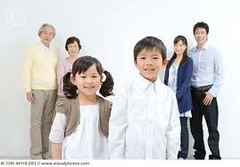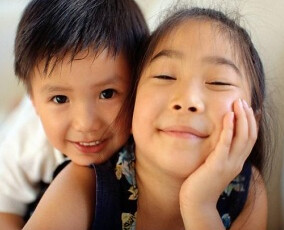
East Meets West: Raising My American Child
A Talk with Parenting Expert Eileen Pisula
We met with famed local parenting expert Eileen Pisula recently to discuss the topic dearest to our heart - - raising a child with Asian values in an American society. Ms. Pisula shared insights and ideas with us from her 25+ years of experience as a mother as well as an educator.

There have been a lot of talk about the academic accomplishment of Asian students, and there are some people who speculate about the parenting style of Asian parents. Needless to say, the book entitled, “Tiger Mom” only added fuel to the fire. Yet, few outside the Asian community understand the dilemma faced by migrant Asian parent who are raised with Confucian values and the parenting contradictions presented by their new environment.
I remember this particularly confused and hurt parent; let us call her “Jane.” Jane has a 13 year old son who was getting straight As, the perfect child until the day he walked up to his parents and told them that they were overbearing and that he was not put on earth to live their dreams for them. Jane just could not understand what she and her husband was doing that could be considered overbearing. As far as Jane was concerned, they were the “coolest” Asian parents ever.
Another time, I was approached by a grandmother who was literally in tears. She said her daughter-in-law had told her to “butt out” of how she raised her 9 year old daughter, Beverley. On the surface this sounds like a case of an interfering mother-in-law, but a deeper look at the situation validated her concerns. Her son and his wife were having a lot of arguments about how she was prematurely talking to Beverley about boys Beverley “likes,” and generally, becoming an “over-American” girl.
In the course of my work, I have met many parents who are struggling with this culture confusion, and had the honor of helping the parents to connect to their personal core value and find a middle ground by fusing it with that of their adopted country. Below some questions I am often asked.
East can meet West, and come out better.
Q1: I feel like the parent from the previous generation had it a lot easier even though they had more children. I don’t understand why this is so.
A: Every day, parents are bombarded by the big corporations and the media telling them what is good for their children and how they should parent; this has resulted in too many parents giving their parental authority to people and companies who do not care about them or their children.
Parents can overcome these challenges by denying commercialism, the third parent, and taking back their parenting authority.
Q2: I try to make sure that my child gets everything that I never had as a child growing up, but they are not grateful for the things they are given or the sacrifices I have made. How can I teach them to be grateful?
A: Such thinking can be worrisome because it is very easy to then burden our children with the debt of owing us the fulfillment of our hopes and dreams for them.
Let us take a step back and ask ourselves this, “My child was not there when I was growing up, so what is it in my childhood that my child misses?”
For children learn gratitude, they need to feel appreciation. Many of today’s children have too much stuff and “noise” going on in their lives, making it impossible to find a moment of quiet to reflect on what they have been given.
It is good to remember that more than anything, our children want us; and start to simplify.
Q3: When I was growing up, my parents expected me to do what I am told without questioning (sometimes not even in my head), and if I did anything wrong I got smacked. Now, I do not wish to parent like them as I now understand that their way of parenting is wrong and bad. How can I get my children to behave without disciplining them?
A: Firstly, let us look at the word “discipline,” it comes from the word disciple, which means “to give knowledge or to mentor.” When we look at the word discipline from that perspective, we understand our roles as mentors or role models versus punishers, and will naturally move away from the harshness of punishment and scolding towards a system of mutual respect and love.
Q4: I want my child to grow up American but am afraid that they may become too caught up with the Western popular culture and forget his roots. How do can I help my child to grow up with a balance of both worlds.
A: Before we can help our child, we need to be clear about who we are, what we value and more importantly, why it is so.
When parents listen to their inner wisdom and make decisions from that point of self-awareness, they help their children to understand and connect to those values too.

Q5: American parents are friends with their children; I would like to do the same but am worried that if I do that, I may lose control of them.
A: What is a friend? She is someone whom we respect, and trust to listen, share and to love us. She supports us, is honest with us and tells us when we do things that hurt us, comforts us when we are down and celebrates our victories with us.
We cannot control or manage another person, but looking at the definition of the word helps is to see that a parent should be their child’s best friend. It is however, important to understand that the needs of our child are largely dependent upon their developmental age; and when our intentions and actions are in alignment, it will bring about the behavior which we want to see in our children.
Q6: There are so many bad things out there. What can I do to ensure that my child does not drop out of school, do drugs and end up in a gang?
A: Children who end up doing all those things have a poor self-image which leads them to seek validation from an external locus,
A child begin to develop a sense of self at about the age of two, and we need to give our children the time, space and quiet to think, discover and become comfortable with who he is, what his value system consists of and what he is worth.
Not to be confused with self-esteem, a healthy self-identity is critical to resilience. A child who knows and is comfortable with who he is will not feel the need to be part of a group or to prove himself to others as he makes the transition from adolescence to adulthood.
Q7: I have seen “good” children suddenly turn rebellious and confrontational when they come into their teen years. What can I do to avoid such a situation?
A: Adolescence is not a dress rehearsal of adulthood. It is a very special, precious and delicate time in a person’s life.
Our relationship with our teenagers begins very early on in their life. Maintaining good communication and an understanding of what our children are going through as they move from childhood to their teen years can help to us to guide our children as they journey towards adulthood.
Q8: My child keeps telling me I do not get it, and will not listen.
A: “Getting it” helps us to understand our children, and the only way to “get it” is by paying attention to our children, what they are saying, what they are doing or who their friends. Be careful though to not be overly intrusive.
One sure way of making sure that our children are listening is to do an audio check. Talk at the right time, ensure that our audience are in the listening mode and actually listening. Our body language, choice of words and tone of voice can decide if our children think what we say is worth listening to.
Q9: Is there really a difference between Western and Eastern parenting?
A: Parenting differs from culture to culture because we bring to our parenting what our history has taught us. By and large, most Asian parents, regardless of whether they are in Asia or here in the United States hold on to the same basic value of respect for elders and authority figures, working hard to get ahead in life, and loyalty and duty to the family’s honor. All of which are worthwhile values but which will be challenged as the world gets smaller. When compared with the warm and fuzzy Western parenting of “I love yous, and You are awesome!” the more pragmatic Asian style of quiet accessible support and sacrifice seem cold, demanding and even draconian.
On the surface things look bleak for the Asian until we speak to an Asian child, and he is likely to tell you that though his parents are not “the type” to hug and kiss, or lavish him with praise and words of love, he KNOWS that he is loved.
Does this mean we should parent the way we always have? I cannot answer the question for parents, but I would like to ask them to consider this question; why do that when we can have the best practices of both worlds.
About Eileen Pisula
|
Eileen Pisula, a mother of two grown-up children, received her professional qualifications at the NIE (Singapore Nanyang Technological University,) ECE Institute (University of Melbourne) and PCI (Seattle Pacific University) Eileen’s favorite phrase “I would be perfectly happy just being a professional student for the rest of my life” gives us an idea of her passion for learning; and she spends much of her spare time reading or doing short courses to keep herself current on the latest research findings about brain development and families dynamics. Her other love is cooking, and she has included it very successfully into past programs to help family members to make connections with each other. In addition to working in the US, she has also worked in countries in the Australia/Asia Pacific regions. Having worked with families and children of all ages for over thirty years, her extensive experience includes classroom teaching, administering schools, working with youth and families at risk, teacher training, and parent coaching. Currently, a parent coach and the program advisor of an after-school program in Arcadia, Eileen has an intimate understanding of the challenges facing parents with very traditional values who are raising children in the more permissive American society, and a media dominated world. Conversant in English, Cantonese and Mandarin, Eileen has dedicated much of her life to helping parents to connect to their core values, and understand that their influence and impact on their child and world they live in cannot be overstated.
|
備註: 本刊請來多位專科醫師﹑ 學者﹑ 資深兒童教師等組成顧問團, 義務提供專業意見; 內容只供參考, 以上本刊及顧問團成員將不會為內容負上法律責任。
